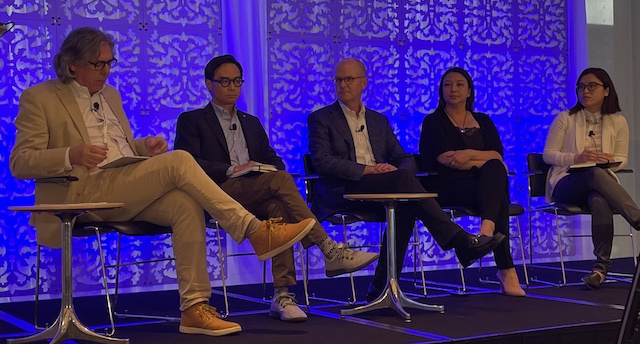
OTTAWA – News is important.
This was a sentiment everyone on the panel discussing compensation for news media at the International Institute of Communications Canada’s annual conference yesterday was able to get on board with – but it was also essentially the only thing everyone agreed on as they discussed the government’s recently introduced Bill C-18, known as the Online News Act.
The panel, moderated by Christopher Dornan (above, left), a retired professor at Carleton University, was composed of four people each representing different interests, which made for a lively debate.
Kevin Chan (second from left), the global director of Facebook’s parent company Meta, argued there is a mechanical issue with Bill C-18.
Noting they are “big fans of evidence-based policy,” Chan argued the challenge with C-18 is “it doesn’t really track to the realities of how the Internet works and it doesn’t track to the realities certainly of how Meta’s platform, in this case Facebook, works.”
The problem is “there’s an unbound liability on our end,” Chan said, explaining that because of the way Facebook is set up to work, they do not control what links and other content people are posting.
“It’s what I would call a mechanical problem, I’m not sure what solve is, but I do think that that is sort of the core challenge.”
Facebook can’t just tell people to go post their stuff somewhere else, he argued.
Jennifer Lee (second from right), executive vice-president and general counsel at Corus pushed back on this, saying of course Facebook can.
“It’s completely misleading for you to say you’re this passive entity, people just post, it’s just an online user community,” she said, arguing that is a simplistic way of putting things.
Lee argued Bill C-18 is about fairness.
Journalism is expensive – “especially in the broadcast sector, news is expensive to produce,” she said, adding traditional revenues streams supporting the public service journalism provides is declining and companies and journalists are being asked to take on that cost.
Lee said they are not looking at C-18 to level everything, but to make things fairer.
“It’s a fairly plainly written bill, it’s easy to understand,” she said. “And at the end of the day, I just want to be clear about it – it’s not a tax, it’s not prescribing any numbers – it’s really just asking fairly sophisticated commercial parties, large ones in many cases, to come to the table and treat Canadian journalists and news organizations fairly. I really struggle to see how that could be controversial.”
Anita Li (right), founder and CEO of The Green Line, an online local news publication, however, pointed out the bill will support certain journalistic organizations, but not others.
“I believe that there definitely needs to be some form of regulation of tech giants,” she said, while adding she is not sure C-18 in its current form “is exactly what local, small public publishers, independent ones, are looking for because it does entrench tech giants like Google and Facebook as part of media business models and it also privileges the most established outlets in this country.”
The way the bill is currently written, Li’s publication will be excluded because it does not meet the requirement for full time staff. Li also pointed to the lack of leverage media start-ups will have in negotiations with tech giants and raised the question of whether large organizations will be willing to negotiate alongside various news outlets they compete with.
This is exactly what News Media Canada hopes will happen – large organizations bargaining with smaller ones.
“The industry is definitely challenged,” said Paul Deegan (centre), president and CEO of News Media Canada. “And with this legislation, what we see from it is basically a way for small and mid-sized publishers to get the same type of arrangement that some of our larger members have been able to negotiate with Google and Facebook.”
Noting there are limitations to the bill, Deegan still indicated it is, from their perspective, “very good legislation.”



